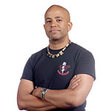Minister Faust's Blog, page 19
September 12, 2011
Is it your Pan-Africanist duty to become a billionaire?
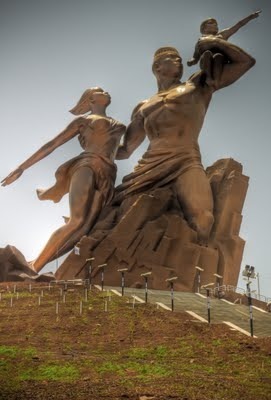 How do we as African peoples, anywhere in the world, free ourselves from economic and political domination?
How do we as African peoples, anywhere in the world, free ourselves from economic and political domination?Maybe that question makes losers of us from the beginning.
Maybe the question should be, "Since we're living in what seems destined to be the Chinese Century, what giant leaps can we make now so that the 2100s will be the Pan-African Century?"
We could begin by asking Fred Swaniker. He's the founder of the African Leadership Academy, and he's recently launched the African Leadership Network Conference, which features a pan-African array of energetic leaders in a TED-style speakers' forum.
Participants expand their social networks, allowing them to build the continent intellectually, culturally, economically, and politically with a range of allies they would otherwise never meet. The ALN provides a context in which the continent is not ignored, and is not a target for contempt disguised as compassion.
New generation of Africa's Leaders must rise to the challenge from African Leadership Network on Vimeo.
Instead, at the ALN, Africa is at the centre of participants' existence, success, and future.
The African Leadership Network convenes its conferences regularly--regionally, and in a major international event. According to its website, the ALN measures its results, publishing hard data annually on "the number of new companies that have been fostered by the network, the number of jobs that ALN collaborations have created for the continent, [and] the amount of investment that members have managed to mobilize across Africa because of relationships they established through ALN."
Bringing Prosperity to Africa through Enterpreneurship from African Leadership Network on Vimeo.
One speaker at a recent ALN, Francis Daniels, discussed what the Singapore success story has to teach the continent's new leaders.
I couldn't disagree more with Francis Daniels on numerous points in his presentation, especially on the alleged need to suppress minimum wages, the alleged legitimacy of a repressive state to achieve economic growth for the owning class, and the alleged illegitimacy of reparations from the Maafa, the largest and most horrific human trafficking in global history.
Drawing lessons for Africa: Example from the Singapore story from African Leadership Network on Vimeo.
Nevertheless, Daniels challenges listeners to rethink their assumptions about how countries can achieve economic growth. When we engage in lively and intelligent debate, we begin walking the path to achieving almost anything.
When I was younger, and surrounded by friends who were Trotskyists, and cognisant of Malcolm X having said at the end of his life that capitalists were blood-suckers, I saw virtually all attempts to make money as morally bankrupt.
But a few things have become clear to me as I've gotten older:
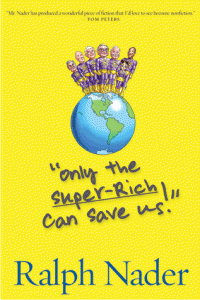 a) Every social justice goal we have is much more easily attained when "we" (whoever "we" are) can pay people to work on the solutions full-time, rather than trying to squeeze in volunteer hours on the side while headed for burn-out. In other words, as Ralph Nader put it so perfectly when discussing his philosophical novel
"Only the Super-Rich Can Save Us!"
(note the quotation marks),
"Justice costs money."
a) Every social justice goal we have is much more easily attained when "we" (whoever "we" are) can pay people to work on the solutions full-time, rather than trying to squeeze in volunteer hours on the side while headed for burn-out. In other words, as Ralph Nader put it so perfectly when discussing his philosophical novel
"Only the Super-Rich Can Save Us!"
(note the quotation marks),
"Justice costs money."
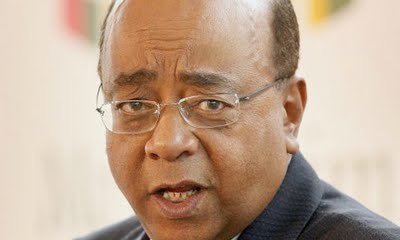 b) People such as Sudanese telecomm pioneer Mo Ibrahim have demonstrated that one can make enormous technological progress that assists democratic change (as with using mobile phones for citizen-based, anti-fraud election monitoring), that has economic spin-offs that help people create jobs for themselves and others (the 20-year growth in continental phones from around 2 million to over 100 million means a lot of people buying phone cards, and those vendors also sell other products, which means personal economic self-determination), and which builds wealth that can drive a continent-changing institution such as the Mo Ibrahim Foundation, including through careful collection and analysis of data for informed progress).
b) People such as Sudanese telecomm pioneer Mo Ibrahim have demonstrated that one can make enormous technological progress that assists democratic change (as with using mobile phones for citizen-based, anti-fraud election monitoring), that has economic spin-offs that help people create jobs for themselves and others (the 20-year growth in continental phones from around 2 million to over 100 million means a lot of people buying phone cards, and those vendors also sell other products, which means personal economic self-determination), and which builds wealth that can drive a continent-changing institution such as the Mo Ibrahim Foundation, including through careful collection and analysis of data for informed progress).That wealth can also create carefully-constructed incentives to promote outstanding, nationally-transformational leadership, especially for African presidents who cannot rely on what Western presidents and prime ministers take for granted: millions of dollars of consultancies and chairmanships and the like when they leave office.
c) Non-Marxist left analyses such as anarchism (literally, "no-leader system"), otherwise known as libertarian socialism, encourage people to create co-ops. In other words, instead of waiting for the revolution to sweep the world and create decent workplaces for all (what I call "Waiting for the Red Rapture"), create with friends and colleagues a workplace right now and run the place democratically or consensually.
Mondragon in Winnipeg is a well-known prairies example, but you can find co-ops all over the world, and some are nearer than we realise.
d) Many of us were raised with the Social Gospel, and were reminded frequently about how much harder it was for a rich man to enter the kingdom of heaven that it was for a camel to pass through the eye of a needle; how it wasn't unionists that Jesus drove out of the temple, but money changers; how "the love of money is the root of all evil" (not from the Gospel, but from the Torah); how Jesus told anyone who wanted to follow him not to give him their money, but to give it away. In other words, we got a radically anti-materialist, and anti-capitalist message (even dating from pre-capitalist times).
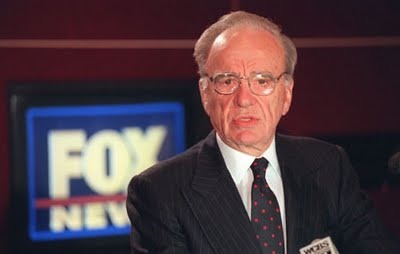 But the problem is that all powerful people across the world
believe the opposite
.
But the problem is that all powerful people across the world
believe the opposite
. Money is power. And poor people, especially disorganised poor people, are almost completely defenseless against the wealthy in that asymmetric warfare.
Money can't make you happy. But as rapper Immortal Technique said, "It's better to be rich and unhappy than broke and miserable." And as rapper Mr. Lif said in the title song to the superb album Black Dialogue:
Yes, hellish foes, and now they rest in peace, thanks for asking
They'd rather teach each other how to fire chrome than to buy a home
There's power in the land that we own
You need capital to start to win at capitalism
Take the money from the sales and find some places to be living
Rather Black landlords than white chalk on the floor
Our mentalities for casualties is keeping us poor
And the poor teach their kids how to work
Rich teach their kids how to invest
Hence we're dying from stress....
If we don't have any money, individually, as African communities in the west, or as African countries or New World African countries, then we're dependent on... on whom? On the wealthy from other communities and nations? On "well-meaning" people who think they're our saviours... or our Saviour?
How's that been working for us?
Western "conservatives" want to occupy our communities and countries with gunmen. Western "liberals" want to occupy us with NGOs. Both hegemonies ensure that they're the ones who run our neighbourhoods or nations, while they control the wealth (either in salaries, or by stealing the material wealth of an entire continent).
But when we build wealth, we can create the institutions we need and deserve (such as the African Leadership Academy, the African Leadership Network, the African Institute for Mathematical Sciences (AIMS), Ashesi University, or the Green Belt Movement, or found innovative animation studios, or be the patrons for stunning artists, or publish our top writers, and sponsor research by our most remarkable engineers, roboticists, brain/computer scientists, young inventors, and historians, people whose work creates jobs in laboratories, publishing, distribution, film-making, festivals, factories, retail outlets, banking, media, and more.
Years ago I would never have imagined that I'd end up writing a novel in which the heroic mentor would be a small businessman. But perhaps I'd underestimated how much effect that Marcus Garvey's do-for-self philosophy, combined with Malcolm X talking on the same subject (prior to 1965), had had on me.
But now here I am. I created Brother Moon--and two of his friends and colleagues--to embody many of the actions and attitudes we need to lay the foundation for the African Century.
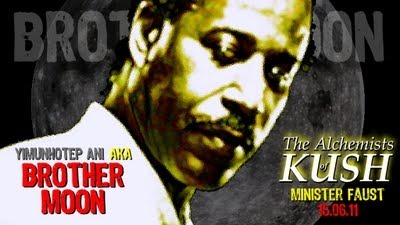
I hope you'll check out the book and let me know what you think about it. It's only $2.99 as an ebook, and the paperback is only $14.99.
 Check out the book trailer and author interview videos here.
Check out the book trailer and author interview videos here.And I'd love to hear your stories about African entrepreneurs from any part of the planet who are building great products, services, and networks, and who are also improving their communities and nations.
(One exception: we all already know about Oprah, so please, no Oprah stories).
Published on September 12, 2011 09:10
What the Motherland should... and shouldn't... learn from Singapore
Drawing lessons for Africa: Example from the Singapore story from African Leadership Network on Vimeo.
The brainchild of African Leadership Academy founder Fred Swaniker, the ALN conference features a pan-African array of energetic leaders in a TED-style speakers' forum.
Participants expand their social networks, allowing them to build the continent intellectually, culturally, economically, and politically with a range of allies they would otherwise never meet. The ALN provides a context in which the continent is not ignored, and is not a target for contempt disguised as compassion.
Instead, at the ALN, Africa is at the centre of participants' existence, success, and future.
The African Leadership Network convenes its conferences regularly regionally and in a major international event. According to its website, the ALN measures its results, publishing hard data annually on "the number of new companies that have been fostered by the network, the number of jobs that ALN collaborations have created for the continent, [and] the amount of investment that members have managed to mobilize across Africa because of relationships they established through ALN."
Speaker Francis Daniels discusses what the Singapore success story has to teach the continent's new leaders. I couldn't disagree more with Francis Daniels on numerous points in his presentation, especially on the alleged need to suppress minimum wages, the alleged legitimacy of a repressive state to achieve economic growth for the owning class, and the alleged illegitimacy of reparations from the Maafa, the largest and most horrific human trafficking in global history.
Nevertheless, Daniels challenges listeners to rethink their assumptions about how countries can achieve economic growth. When we engage in lively and intelligent debate, we begin walking the path to achieving almost anything.
Published on September 12, 2011 09:10
September 8, 2011
I Wish Obi-Wan Had Been a Brotherman
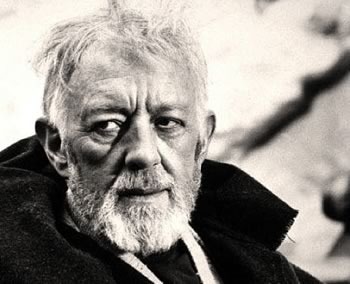 Since as long as I can remember, I've loved stories that demonstrated an unshatterable bond between a boy hero and his mentor.
Since as long as I can remember, I've loved stories that demonstrated an unshatterable bond between a boy hero and his mentor.And why wouldn't I? That archetypal relationship—for men and women—is ancient, found in all epics and religions and probably every cherished story that has survived its birth generation to be passed on to history.
That's why it burns my balls that Hollywood, Big Publishing and the Edumacational System have delivered almost no stories featuring complex, fascinating, dynamic African characters in that role of life-deconstructor/reconstructor. And don't be telling me about Bagger Vance or Mother Abigail or the dude from The Green Mile. More on all of that jive later.
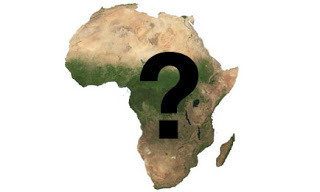 Mentors, or in archetypal terms, shamans, are the transformational guides who train young, untested seekers to become heroes. Shamans help the foolish to become wise, the weak to become strong, the alienated to emerge celebrated, and the lost to find their destinies.
Mentors, or in archetypal terms, shamans, are the transformational guides who train young, untested seekers to become heroes. Shamans help the foolish to become wise, the weak to become strong, the alienated to emerge celebrated, and the lost to find their destinies. Luke had Ben. Tom Joad had Jim Casey. Neo had Morpheus who in turn had the Oracle. Odysseus had Mentor (who gave us the name); Arthur had Merlin; Cinderella had the Fairy Godmother; the Pandavas had Lord Krishna; Jesus had John the Baptist; Muhammad had Jibreel (Angel Gabriel), as did Joan of Arc; the X-Men have Professor X, Frank Black has Peter Watts, and the Powerpuff Girls have Professor Utonium.
Luke had Ben. Tom Joad had Jim Casey. Neo had Morpheus who in turn had the Oracle. Odysseus had Mentor (who gave us the name); Arthur had Merlin; Cinderella had the Fairy Godmother; the Pandavas had Lord Krishna; Jesus had John the Baptist; Muhammad had Jibreel (Angel Gabriel), as did Joan of Arc; the X-Men have Professor X, Frank Black has Peter Watts, and the Powerpuff Girls have Professor Utonium.It's easy to spot a shaman. He or she, almost always, is all five of the following for the young, untested seeker:
1. A medicine man or woman , that is, a physical, mental and/or emotional healer2. A mystic , that is, a visionary (via scientific, kinaesthetic, artistic, cultural, or supernatural knowledge)3. A guardian and adept , that is, a protector and trainer in magic (meaning a great power, an important skill, a mysterious science)4. A gatekeeper , that is, an initiator into a secret or closed order5. A lunatic or even an imaginary friend.
Seriously: lunatic?
Let's be clear: being labelled a lunatic is often as simple as being completely misunderstood by your community. If everyone things you're not just wrong, but actually totally wrong about everything, they'll call you crazy. And if they think you're a big enough threat, they might even cut off your head (poor ol' John the Baptist. At least Quebec gave you a day of your own every year. Hope you're getting your fill of locusts).
Maybe they think you're a head case because you're making all kinds of claims about bizarre things no one else can see with their own eyes, things that exert massive control over all of us (germs, DNA, radiation, gravity), or forces you claim are basically the flesh of the entire universe (atoms, subatomic particles, or, my favourite, vibrating nano-nano-nano-strings).
So be warned: if you want to be teaching some far-out stuff, be careful about sending out for drinks.
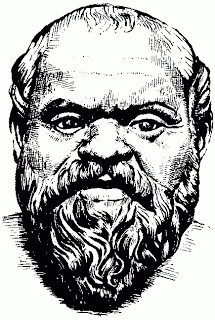 Socrates, or maybe my friend Bernie.And if your shaman happens to be an angel, a god, Caprica Six, Dean Stockwell in Quantum Leap, or the Great Gazoo, at least to the world, he or she is definitely in that "imaginary friend" category. But don't worry… I understand the new straitjackets are much more comfortable. You can bet poor Joan of Arc would've settled for one if that'd been on the table.
Socrates, or maybe my friend Bernie.And if your shaman happens to be an angel, a god, Caprica Six, Dean Stockwell in Quantum Leap, or the Great Gazoo, at least to the world, he or she is definitely in that "imaginary friend" category. But don't worry… I understand the new straitjackets are much more comfortable. You can bet poor Joan of Arc would've settled for one if that'd been on the table.
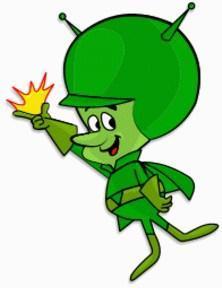 Everybody needs a shaman, and if you never get one of your own, it's damned near impossible to become an adult (no matter how old you are, or aren't). Oh, you can do it… it's just much tougher. Like putting on make-up with a paint roller. It works—it just takes longer. And the results aint pretty.
Everybody needs a shaman, and if you never get one of your own, it's damned near impossible to become an adult (no matter how old you are, or aren't). Oh, you can do it… it's just much tougher. Like putting on make-up with a paint roller. It works—it just takes longer. And the results aint pretty.
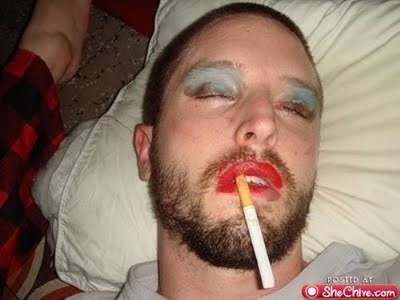 In terms of developmental psychology, shamans take over from where parents leave off. We all need and deserve effective, loving parents, but if we stay under their protection and training forever, we'll remain children, or at best, second-generation (and probably second-rate) knock-offs of mum and dad.
In terms of developmental psychology, shamans take over from where parents leave off. We all need and deserve effective, loving parents, but if we stay under their protection and training forever, we'll remain children, or at best, second-generation (and probably second-rate) knock-offs of mum and dad.I just wish that SF/F books, films, and TV gave us more African shamans.
And I don't mean kot-tam super-duper magical negroes.
 Super-duper magical negroes? What are those? As author Nnedi Okorafor explains:
He or she is a person of colour
, typically [African], often Native American, in a story about predominantly white characters.
He or she seems to have nothing better to do than help the white protagonist
, who is often a stranger to the Magical Negro at first.
He or she disappears, dies, or sacrifices something of great value after or while helping the white protagonist
.
He or she is uneducated, mentally handicapped, at a low position in life, or all of the above.
He or she is wise, patient, and spiritually in touch.
Closer to the earth, one might say. He or she often literally has magical powers.
Super-duper magical negroes? What are those? As author Nnedi Okorafor explains:
He or she is a person of colour
, typically [African], often Native American, in a story about predominantly white characters.
He or she seems to have nothing better to do than help the white protagonist
, who is often a stranger to the Magical Negro at first.
He or she disappears, dies, or sacrifices something of great value after or while helping the white protagonist
.
He or she is uneducated, mentally handicapped, at a low position in life, or all of the above.
He or she is wise, patient, and spiritually in touch.
Closer to the earth, one might say. He or she often literally has magical powers.
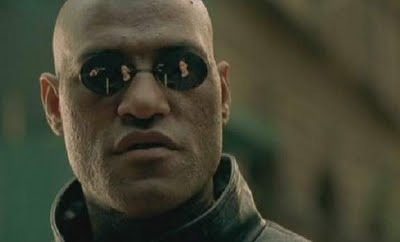 My man Morpheus, who I truly dig, is still dangerously close to being a S.D.M.N., especially since he seems to have no internal life or his own, and the films (notably the second one) grant him only a few relationships that have little or nothing to do with Neo (or Whitefolks in general).
My man Morpheus, who I truly dig, is still dangerously close to being a S.D.M.N., especially since he seems to have no internal life or his own, and the films (notably the second one) grant him only a few relationships that have little or nothing to do with Neo (or Whitefolks in general).But in fairness, except for Neo, Agent Smith, and Cipher, few of the Matrix characters have any emotional or psychological depth. (And what a shame, since Laurence Fishburne's performance is one of the best in the series, and since Morpheus's demeanour is so enigmatic and his deeds exciting).A better example of the S.D.M.N. is Bagger Vance from The Legend of Bagger Vance, and I guess by mentioning that in public, I've destroyed any chance I would've had to write a movie starring Will Smith, which is apparently why Spike Lee didn't get to direct Ali. Too bad. Will Smith would've been a great Brotherfly in Shrinking the Heroes. Ah, well… there's always Andre 3000.
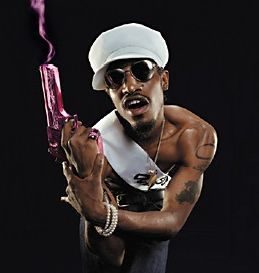 No, if you want a great coloured shaman who isn't an S.D.M.N., check out Mr. Miyagi.
No, if you want a great coloured shaman who isn't an S.D.M.N., check out Mr. Miyagi.First off all, he clearly enjoys effing up Daniel-San's head with all those wax on/wax off passive aggressive karate lessons, not to mention beating the shit out of bullies, rather than shucking and jiving to make them feel com-fort-able around his coloured ass and I-aint-even-trying-to-fit-in-after-forty-five-years-in-this-country accent.
Second, Miyagi has an actual personal history full of relationships radiating of poignant trauma, which directly embrace the central irony of Karate Kid: Mr. Miyagi (Okinawan-American) has no son to whom to grant his family karate-do, because the (White) United States government put his pregnant wife in a concentration camp, which killed her and his son during childbirth.
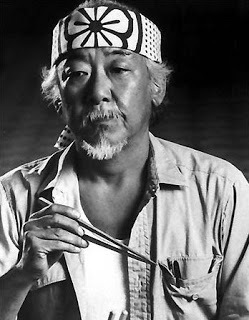 So Miyagi's only "heir" is a White youth, a child of the people who ended his line and put his fellow citizens in jails and stole their property. But Miyagi accepts Daniel, because the kid is an outsider and a victim of the same brand of thugs who exterminated his own family.
So Miyagi's only "heir" is a White youth, a child of the people who ended his line and put his fellow citizens in jails and stole their property. But Miyagi accepts Daniel, because the kid is an outsider and a victim of the same brand of thugs who exterminated his own family.Had it not been for his compassion for another hunted human being, there's no way Miyagi would've opened a Cobra Kai of his own to start schooling ethnic-cleansing hordes of gaijin. Maybe that's why Miyagi enjoyed beating the balls off of Daniel's tormentors so much—they were as close as he could get issuing a smack-down onto the people who destroyed his life. Either way, decades later, he still can't stop himself from getting drunk and sobbing about what the (White) US government did to him.
Okay, great for Okinawan-American shamans (and while a martial arts role is a stereotype, it was an iconic role and outstanding performance, no doubt). But how many Nigerian, Jamaican, South African, Kenyan, Somali, Brazilian, Cuban, or African-American shamans do we have in books, in comics, or onscreen?
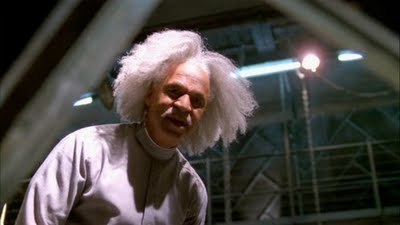 It's possible that Book from Firefly could have become a quality African shaman, had that series not died in the crib and had Book not suffered (in the feature Serenity) the traditional Hollywood fate for a Brotherman in a movie about White heroes: becoming a sacrificial negro (I'm looking at you, X-Men: First Class) in a death that (for someone like me who hadn't watched the series) had no emotional impact at all). But I doubt that. Let's just say that Joss Whedon probably isn't going to win any NAACP Image Awards in the near future.
It's possible that Book from Firefly could have become a quality African shaman, had that series not died in the crib and had Book not suffered (in the feature Serenity) the traditional Hollywood fate for a Brotherman in a movie about White heroes: becoming a sacrificial negro (I'm looking at you, X-Men: First Class) in a death that (for someone like me who hadn't watched the series) had no emotional impact at all). But I doubt that. Let's just say that Joss Whedon probably isn't going to win any NAACP Image Awards in the near future.Anybody else? I sure wish there'd been more of Old Man in A Man Called Hawk, but hell, I can't even find a single YouTube video of him… or even a kot-tam photo! And in SF/F… man, is there anybody? Except for Morpheus and the Oracle who—excellent performances aside—were essentially devoid of humanity (literally in the case of the Oracle, despite Gloria Foster's great performance and the best lines in the series), I can't think of anybody.
So in the spirit of lighting a candle instead of cursing the darkness… oh, wait… um… lighting some incense instead of cursing the fart… allow me to present a few African mentors I've loved.
Socrates Fortlow from Walter Mosley's Always Outnumbered, Always Outgunned
Usually shamans are supporting characters, but in Walter Mosley's superb Socrates Fortlow series of "philosophical investigations," it's the protagonist who is the shaman (although he still has his own "untested seeker" hero's journey to complete).
Socrates Fortlow, whose very name tells us he's a wise man vulnerable inside a useless stronghold, isn't one of those ex-cons who went to prison (for 27 years) for crimes he didn't commit.
Oh, he committed the crimes. He committed the fuck out of those crimes. He was, by his own admission, a monster of a man who did monstrous things, and once inside prison, he became even more monstrous, not simply to survive, but because he'd come to enjoy inflicting agony and terror.
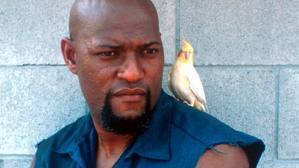 But eight years after he eventually leaves prison, full of rage and alienated from a world he could hardly recognise, Socrates determines to transform himself into something better than he'd ever been. And when a teenager named Darryl violently breaks into his life, Socrates recognises that the time to change is right there and then.
But eight years after he eventually leaves prison, full of rage and alienated from a world he could hardly recognise, Socrates determines to transform himself into something better than he'd ever been. And when a teenager named Darryl violently breaks into his life, Socrates recognises that the time to change is right there and then.Over the course of two more novels, Socrates battles local criminals ranging from street thugs to economic exploiters, investigates a killer cop, engulfs Los Angeles in a riot, sends his dearest friend to his death, and raises a son.
I first encountered Mosley's novel around 1998 or so, and it's haunted me ever since. I can't imagine it ever being dislodged from the list of my ten favourite novels.
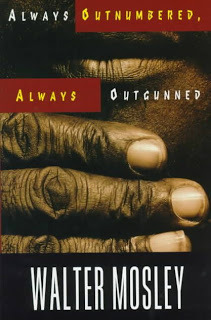 I love Laurence Fishburne as an actor; while he was too young to play 57-year-old Fortlow in this adaptation, and while Michael Apted's direction on the project rarely rises above workmanlike, I still enjoyed several scenes from the film.
I love Laurence Fishburne as an actor; while he was too young to play 57-year-old Fortlow in this adaptation, and while Michael Apted's direction on the project rarely rises above workmanlike, I still enjoyed several scenes from the film.Dr. Jerome Davenport from Antwone Fisher Antwone Fisher is a real man, and Antwone Fisher is apparently a fairly accurate dramatisation of his life. Raised in poverty, misery, and abuse, Fisher joined the American navy (an instrument of global imperial enforcement and, in the case of Iraq, genocide) and ironically found a measure of peace there… and a mentor who changed his life.
(In reality, as I understand it, Fisher had more than one mentor, but in Denzel Washington's brilliant direction of Fisher's top-notch script, all the mentors are collapsed into a single shaman: Dr. Jerome Davenport, played by Washington himself in one of his most understated, vulnerable, and unforgettable performances.)
Because of his past, protagonist Antwone Fisher is terrified of most of the world, and when anyone disturbs the tiny and extremely separate peace he's carved out for himself, he lashes out—even violently. He's afraid of being vulnerable with anyone, so he has no friends, no girlfriend, and no guide. Sentenced to therapy following an assault against a fellow sailor, Fisher finds Dr. Davenport, a navy man who is one of the most well-realised shamans I've ever seen onscreen.
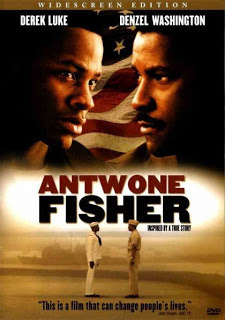 Davenport is no clichéd take-no-shit-military-man, nor is he an easy going, break-all-the-rules wild man like Robin Williams in Dead Poets Society. Instead, this shaman works the magic of personal and emotional forensic examination.
Davenport is no clichéd take-no-shit-military-man, nor is he an easy going, break-all-the-rules wild man like Robin Williams in Dead Poets Society. Instead, this shaman works the magic of personal and emotional forensic examination.And like all the most engaging shamans, Davenport's own interior and social life is full of its own conflict; the therapist is an incomplete man who himself suffers; he needs a young, untested seeker so that he can complete his own transformation. And that transformation demands a sacrifice than is almost too much for either Davenport or Fisher to bear. Antwone Fisher is, with Malcolm X, the only film I can think of that made me cry twice during the same viewing.
Uncle from Njabulo Ndebele's "Uncle" in the collection Fools and Other Stories
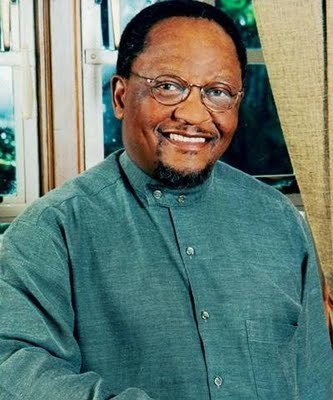 "Uncle," a novella by South African professor and writer Njabulo Ndebele, tells the story of a fatherless boy whose uncle, a jazz trumpeter/ladies' man/shit disturber/prodigal son/Africentric intellectual, comes to visit when life on tour becomes too much hassle.
"Uncle," a novella by South African professor and writer Njabulo Ndebele, tells the story of a fatherless boy whose uncle, a jazz trumpeter/ladies' man/shit disturber/prodigal son/Africentric intellectual, comes to visit when life on tour becomes too much hassle.Uncle draws lessons from both everyday life and aesthetic experience to help his nephew discover and analyse the architecture of human existence. He descants upon the irony that the closed eye still sees, since its pupil reaches greatest dilation only when its lid is shuttered; that small humiliations are beneficial, since they inoculate us against committing the gigantic ones that would rip our asses right off our hips; that only highly-trained jazz players and painters can improvise beautifully, since true freedom requires the greatest discipline and preparation of all.
Not that the novella, or the character Uncle himself, is preachy. Instead it's sexy, hilarious, touching, endearingly awkward, and as is as sweet and brimming with risk, exhilaration, and life as a bee-swarming honeycomb.Furious Styles from Boyz N the Hood Furious Styles, father and Blastmaster. As a dad, much less Mike Brady than Malcolm X. And dude even cuts heads.
And it's Fishburne again, Rã love him, in one of my favourite performances. Furious Styles is an atypical shaman in that he's the biological father of the young, untested seeker … but because he's been the non-custodial parent for probably ten or more years, he still represents a break from the seeker's primary parental experience.
The stand-out character from John Singleton's 1991 directorial debut, Furious Styles was an electrifying dramatisation of the masculine side of the North American Africentric movement, even if he didn't wear locks, beads, or dashikis, or carry a verb stick.
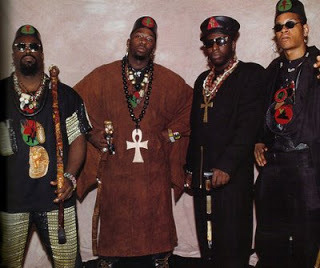 Brotherman delivered his own sermon on the mount, ripping the mic on economic self-determination and the hidden hand behind African American fratricide. And when he was cutting your head, he'd even school you on Jimmy discipline and defense.
Brotherman delivered his own sermon on the mount, ripping the mic on economic self-determination and the hidden hand behind African American fratricide. And when he was cutting your head, he'd even school you on Jimmy discipline and defense. For me, who always had to pay to get cut, seeing Furious up there trimming his boy's skull was one of the most understated and touching movie moments I'd ever seen. And so archetypally rich: dude is cutting his son (branding him as his own, but marking him for manhood; the shears can inflict pain, but in the hands of a caring shaman, they're an implement for bonding).
Understand that this was 1991. Only a few years before, when Spike Lee just resumed Oscar Micheaux's revolution, Hollywood offered almost no roles to African actors at all, and the few it did offer were "only" parts, as in, "I'm the only Brother in this film." If you weren't a 3D Bugs Bunny like Axel Foley, or playing a toy, chances were against you appearing onscreen at all. And as much as I loved Spike's joints, none of his films featured a shaman until 1992's Malcolm X.
And, sadly, in movies at least, I can't think of any characters like Furious Styles since 1991.
Major Bunny Colvin from Season Three and Four of The Wire
Major Bunny Colvin, played by screen juggernaut Robert Wisdom, is the 11:59 Drug War peace activist who creates—without permission from any level of government—several drug non-enforcement zones inside Baltimore's most devastated neighbourhoods. His plan begins as a way of draining the marshes across his city, and dumping the waters into a few giant swamps: let the mosquitoes breed there, leaving the rest of the city free of malaria.
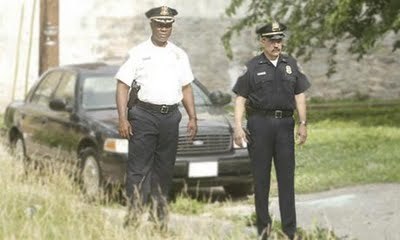 But Bunny's in for the biggest case of mission creep of his entire career. Turns out you can't simply decriminalise drugs and expect social misery just to up and disappear.
But Bunny's in for the biggest case of mission creep of his entire career. Turns out you can't simply decriminalise drugs and expect social misery just to up and disappear.Instead, Colvin's accidentally built a misery supercollider. And to clean up his own mess will mean bringing in security, clean water, condoms, a needle exchange (while trying to avoid getting caught by the media and his superior, or turned in by street cops who'd rather just smash heads).
As Mayor of "Hamsterdam," Colvin sees that giant social problems can't be solved by shooting them down or locking them up. Badges and beat downs won't do shit. Nope. Giant problems need giant solutions. Marshall Plan-style.
And that's at the heart of Colvin's heroic, Sisyphean struggle: his actual commitment to justice embodied in the true meaning of Malcolm X's slogan by any means necessary. What began as a giant F-U to his vicious, ass-kissing/ass-covering superiors turned into a crusade to make his city a place where citizens could live, walk, and work in safety. Not the terrified safety of apartheid-walled-in-suburbs for the hegemons… but safety and dignity for everybody. By his courage and his commitment, even at gigantic risk to himself, Colvin earns the moral credibility to help an undisciplined bully of a cop, the young, untested seeker Sergeant Ellis Carver, to leave behind his brutal, destructive, and counterproductive policing strategy (terrorise and rout), in favour of building respect and then trust so as to gain the intell necessary to do quality police work and make the alleyways, corners, and front stoops safe for decent folk.
And when Bunny chooses the school system as his next theatre of operations, he's just as determined to use any methods, no matter how unorthodox, to build justice for and with his young charges.
For one arrogant, shit-talking, but smart young man, Bunny Colvin is a major levelling-up from his own dad, a drug dealer and killer who'll spend the rest of his life in prison. Bunny Colvin becomes, in fact, the most profoundly transformative figure that this young man could ever hope to enter his life.
Kareem Said from Oz The brilliant Oz, almost completely and unfairly eclipsed by also-excellent The Wire, portrayed the odyssey of one of the most complex shamans ever projected onto American screens. As played by Eamonn Walker, Kareem Said was a Muslim imam sent to Oswald Maximum Security Prison for torching a warehouse (I can no longer remember the reason, but I seem to recall the warehouse or its owner were threats to the African American community).
At series' beginning, Said was a swaggering intellectual and devout mujahid (holy warrior) who was devoted to saw Oswald prison as an institution so corrupt that only war and fire could redeem it. But after surviving the Attica-style rebellion of his own making, Said confronts the defects of his own soul, especially that of his enormous pride, enough that he rethinks almost everything about his life.
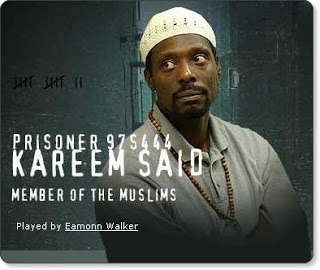 Kareem's quest for justice, regardless of his own personal feelings, turns him into a jailhouse attorney who defends Neo-Nazi Vern Shillinger in court because he thinks the man isn't guilty of the crime he's charged with; he risks losing control of his African-only congregation by allowing Tobias Beecher, a rich, White, bisexual man, to join them for Qur'anic study, reasoning that Islam is not racial, but universal. He nearly loses his own life by opposing the criminal conspiracy and depravity of the drug baron Simon Adebisi.
Kareem's quest for justice, regardless of his own personal feelings, turns him into a jailhouse attorney who defends Neo-Nazi Vern Shillinger in court because he thinks the man isn't guilty of the crime he's charged with; he risks losing control of his African-only congregation by allowing Tobias Beecher, a rich, White, bisexual man, to join them for Qur'anic study, reasoning that Islam is not racial, but universal. He nearly loses his own life by opposing the criminal conspiracy and depravity of the drug baron Simon Adebisi.Said struggles—sometimes against himself—to lift up men from the mud, men such as the narcissistic Poet who betrays him, a mole aimed to destroy him, the rebel lieutenant Zahir Arif, and the reprobate Omar White. Said's personal struggles and history are convoluted, conflicted, and full of half-victories and glorious defeats.
And with the elevated speech of a philosopher, a yearning for justice, an unquenchable intellect, and the gravitic performance of Eamonn Walker breathing life into him, Kareem Said achieved a dramatic height that is unlikely to be surpassed for the foreseeable future.
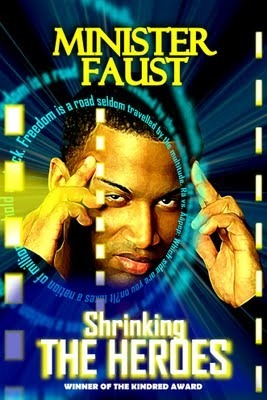 I was so impressed by Kareem Said that I gave the X-Man from my award-winning political satire
Shrinking the Heroes
the same first name.
I was so impressed by Kareem Said that I gave the X-Man from my award-winning political satire
Shrinking the Heroes
the same first name.(Kareem Philip Edgerton's other two names are equally connected to Tom Fontana shows: Dr. Phillip Chandler from St. Elsewhere, and Harry Edgerton, the real-life Baltimore detective who was the inspiration for Frank Pembleton in Homicide. All three characters are what I call the archetype of the Malcolm X Professional, a welcome antidote to TV's previous, well-intentioned, and hyper-boring, ultra-non-threatening African men. Those snooze-inducers are still around… looking at you, Star Trek: Enterprise.)
THE ALCHEMISTS OF KUSH
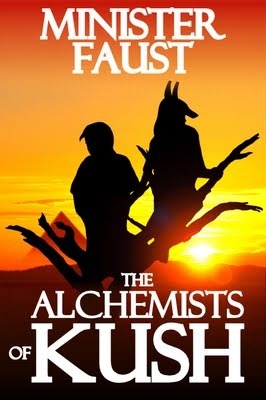 When I first started conceiving the story that eventually became the novel The Alchemists of Kush, had several goals, and many of them dealt with shamans, rites of passage, and transformation.
When I first started conceiving the story that eventually became the novel The Alchemists of Kush, had several goals, and many of them dealt with shamans, rites of passage, and transformation.When I was in 20s I'd read and been moved by Robert Bly's mythopoeic discussion of seekers and shamans in Iron John. I'd also been fascinated by the history of the Five Percenters, or Nation of Gods and Earths, a mystical community (with strong similarities to ancient "mystery systems" employing a catechism, passwords, and rites of passage) that separated in the mid-1960s from the Nation of Islam, led by founder Father Allah. (You can check the blog and radio series I did on the NGE here, here, and here.)
And the summer I turned 20, I read Cheikh Anta Diop's classic book The African Origin of Civilisation: Myth or Reality?, about how Eurocentric, imperialist revisionists had de-Africanised Ancient Egypt; that was the same summer that KRS-One released Ghetto Music: The Blueprint for Hip Hop, which address some of the same issues Diop had.
I fell in love with Ancient Egypt, and in one way or another it's influenced or been featured in all of my work, and in particular, the foundational story of Lord Usir (Osiris) and Lady Aset (Isis), their son Hru (Horus), and their enemy, the usurper Set. That story is the prototype for Cain and Abel, Moses, and myriad other tales that have inspired mythology and religion.
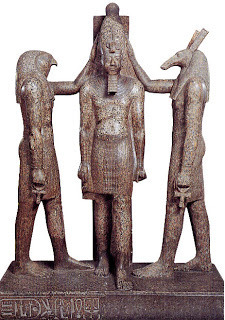 So I sought to create a novel that could embody all the above. My allegory would be three-way: telling a modern story that would parallel both the foundational Egyptian myth, and the founding of the Five Percenters. And through it, I'd dramatise the reality and necessity of rites of passage for boys to become men, via the fictional (allegorical) Africentric mystery school, the Alchemists.
So I sought to create a novel that could embody all the above. My allegory would be three-way: telling a modern story that would parallel both the foundational Egyptian myth, and the founding of the Five Percenters. And through it, I'd dramatise the reality and necessity of rites of passage for boys to become men, via the fictional (allegorical) Africentric mystery school, the Alchemists.And the shaman would be named Yimunhotep Ani, AKA Brother Moon.
The Alchemists of Kush has gotten intense and widespread acclaim. Ishmael Reed says, "It was only a matter of time before the hip hop culture would invade the literary world. With The Alchemists of Kush, Minister Faust is leading the invasion. His novel is possibly the first hip hop epic. Hip hop has a short attention span on most occasions. The Alchemists of Kush gives it gravitas."
The ebook is only $2.99, and the paperback is only $14.99.
You can check out the book trailer and an author interview/walkabout below.
Published on September 08, 2011 16:06
August 4, 2011
The Africentric TED: The African Leadership Network conference
Fred Swaniker, Co-Founder & CEO of ALN, discusses the establishment and vision of ALN from African Leadership Network on Vimeo.
Fred Swaniker, founder of the African Leadership Academy and the African Leadership Network, is no Afro-pessimist. In fact, I'd say he's a real-world, internationalist example of an Afrofuturist, a true Imhotep-hop man.And while he's busy building excellence, he's also helping, among those who follow his example, to destroy two poisonous Western myths about the 54 countries of the African continent and their billion citizens.One myth serves self-described conservatives, and the other serves self-described liberals. The conservative myth is that Africans are so primitive and backward that they're useless, and any attempt to save them is doomed.The liberal myth is that because Africans are so primitive and backward, they're useless in any attempt to save themselves, and thus require the benevolent intervention of White saviours… including people who may view themselves collectively as The Saviour.Both myths ignore the foundation of humanity and civilisation itself in Africa, ignore African's vast linguistic, cultural and national diversity, and ignore the remarkable political, economic and telecommunications achievements that many countries across the continent have accomplished in the last twenty years.Fred Swaniker is a model of the very leadership that he teaches. Recognising that self-determination requires young, energetic leaders with excellent education, practical training, and diverse and far-ranging social networks, in 2004 Swaniker co-founded the African Leadership Academy in South Africa.The ALA is a high school whose students hail from across the continent, recruited not only from elites but from the poor. In their Johannesburg school, student receive a world-class education with an emphasis on leadership development and entrepreneurship with a pan-Africanist perspective.The ALA is a high school whose students hail from across the continent, recruited not only from elites but from the poor. In their Johannesburg school, students receive a world-class education with an emphasis on leadership development and entrepreneurship using a pan-Africanist perspective.Emboldened by his success with the ALA, in 2010 Swaniker co-founded the African Leadership Network. Modelled in part after the international TED lecture series, the African Leadership Network conference is designed so that participants can expand their networks, allowing them to build the continent intellectually, culturally, economically, and politically with a range of allies they would otherwise never meet, and in a context in which the continent is not ignored, nor is it a target for contempt disguised as compassion, but rather as the centre of their existence and future.The African Leadership Network convenes its conferences regularly regionally and in a major international event. According to its website, the ALN measures its results, publishing hard data annually on "the number of new companies that have been fostered by the network, the number of jobs that ALN collaborations have created for the continent, [and] the amount of investment that members have managed to mobilize across Africa because of relationships they established through ALN."The ALN site on Vimeo contains more than 20 outstanding speeches. A few highlights include:
Bright Simons, founder of MPedigree, discussing his cutting-edge platform for stopping the lethal sale of counterfeit drugs worth hundreds of millions of dollars, by using a telecomm drug-verification network, and
Innovations out of Africa: fighting pharmaceutical counterfeits with cellphones from African Leadership Network on Vimeo.
Zimbabwean Deputy Prime Minister Dr. Arthur Mutambara, challenging Africa's new generation of leaders.
New generation of Africa's Leaders must rise to the challenge from African Leadership Network on Vimeo.
Addis Alemayehou of Paconet on Ethiopia's economic ascendancy.
Eradicating Poverty one person at a time. from African Leadership Network on Vimeo.

Fred Swaniker, founder of the African Leadership Academy and the African Leadership Network, is no Afro-pessimist. In fact, I'd say he's a real-world, internationalist example of an Afrofuturist, a true Imhotep-hop man.And while he's busy building excellence, he's also helping, among those who follow his example, to destroy two poisonous Western myths about the 54 countries of the African continent and their billion citizens.One myth serves self-described conservatives, and the other serves self-described liberals. The conservative myth is that Africans are so primitive and backward that they're useless, and any attempt to save them is doomed.The liberal myth is that because Africans are so primitive and backward, they're useless in any attempt to save themselves, and thus require the benevolent intervention of White saviours… including people who may view themselves collectively as The Saviour.Both myths ignore the foundation of humanity and civilisation itself in Africa, ignore African's vast linguistic, cultural and national diversity, and ignore the remarkable political, economic and telecommunications achievements that many countries across the continent have accomplished in the last twenty years.Fred Swaniker is a model of the very leadership that he teaches. Recognising that self-determination requires young, energetic leaders with excellent education, practical training, and diverse and far-ranging social networks, in 2004 Swaniker co-founded the African Leadership Academy in South Africa.The ALA is a high school whose students hail from across the continent, recruited not only from elites but from the poor. In their Johannesburg school, student receive a world-class education with an emphasis on leadership development and entrepreneurship with a pan-Africanist perspective.The ALA is a high school whose students hail from across the continent, recruited not only from elites but from the poor. In their Johannesburg school, students receive a world-class education with an emphasis on leadership development and entrepreneurship using a pan-Africanist perspective.Emboldened by his success with the ALA, in 2010 Swaniker co-founded the African Leadership Network. Modelled in part after the international TED lecture series, the African Leadership Network conference is designed so that participants can expand their networks, allowing them to build the continent intellectually, culturally, economically, and politically with a range of allies they would otherwise never meet, and in a context in which the continent is not ignored, nor is it a target for contempt disguised as compassion, but rather as the centre of their existence and future.The African Leadership Network convenes its conferences regularly regionally and in a major international event. According to its website, the ALN measures its results, publishing hard data annually on "the number of new companies that have been fostered by the network, the number of jobs that ALN collaborations have created for the continent, [and] the amount of investment that members have managed to mobilize across Africa because of relationships they established through ALN."The ALN site on Vimeo contains more than 20 outstanding speeches. A few highlights include:
Bright Simons, founder of MPedigree, discussing his cutting-edge platform for stopping the lethal sale of counterfeit drugs worth hundreds of millions of dollars, by using a telecomm drug-verification network, and
Innovations out of Africa: fighting pharmaceutical counterfeits with cellphones from African Leadership Network on Vimeo.
Zimbabwean Deputy Prime Minister Dr. Arthur Mutambara, challenging Africa's new generation of leaders.
New generation of Africa's Leaders must rise to the challenge from African Leadership Network on Vimeo.
Addis Alemayehou of Paconet on Ethiopia's economic ascendancy.
Eradicating Poverty one person at a time. from African Leadership Network on Vimeo.
Published on August 04, 2011 11:26
July 7, 2011
The Coyote Kings, Book Two: Uranium City... coming in 2012
Published on July 07, 2011 13:02
June 15, 2011
Today's the day. Please buy THE ALCHEMISTS OF KUSH.
 If
The Alchemists of Kush
hits the Kindle Top 100 today, I'll donate $500 to ship university textbooks to South Sudan's Dr. John Garang Memorial University.
If
The Alchemists of Kush
hits the Kindle Top 100 today, I'll donate $500 to ship university textbooks to South Sudan's Dr. John Garang Memorial University.Please visit ministerfaust.com for the buy link. You can get the entire novel for only $2.99.
You can also get other books by me while you're there. Right now there are three books of short stories. By late afternoon, you'll be able to get BOTH of my previous novels at the same place.
Two books of short stories and two novels... only $2.99 each!
Published on June 15, 2011 10:53
June 12, 2011
Advance praise for THE ALCHEMISTS OF KUSH
 "It was only a matter of time before the hip hop culture would invade the literary world. With The Alchemists of Kush, Minister Faust is leading the invasion. His novel is possibly the first hip hop epic. Hip hop has a short attention span on most occasions. The Alchemists of Kush gives it gravitas."
"It was only a matter of time before the hip hop culture would invade the literary world. With The Alchemists of Kush, Minister Faust is leading the invasion. His novel is possibly the first hip hop epic. Hip hop has a short attention span on most occasions. The Alchemists of Kush gives it gravitas."—Ishmael ReedAuthor of Mumbo Jumbo and Juice!
"Minister Faust's first two books broke new ground in the SF field. His latest, The Alchemists of Kush, not only breaks new ground; with the story-telling skills of a modern jali, the Minister creates new vistas of history, mythology, erudition, uplift, tragedy, triumph, and contemporary community activism. Once you start the first page of this book, you won't be able to put it down until you've finished the last one."
—Charles R. SaundersAuthor of Imaro and Dossouye
"I started The Alchemists of Kush and kept reading until I finished. Minister Faust has the most electrifying and true voice I've read in years. The Alchemists of Kush is brilliant."
—Sparkle HayterAuthor of What's A Girl Gotta Do? and Naked Brunch
"I loved the story, the mythology, and the characters. I found myself locked into it for hours at a time and couldn't put it down. Rich in detail ...A great book."
—Kenneth T. WilliamsPlaywright of Thunderstick and Three Little Birds
"A hell of a story. A hell of a book. A hell of a style. A frenetic novel and voice—very enjoyable. Minister Faust knows how to write about male relationships, brotherhoods, and getting into the hearts of men, and about boys turning into men. The Alchemists of Kush is a triumph, not just for Minister Faust, but for Edmonton and the community of Kush."
—Wayne ArthursonAuthor of Final Season and Fall from Grace
"Inspired by a true story and set against an urban backdrop of African immigrant communities in present day Edmonton, Minister Faust weaves a masterful tale around the sacred Book of the Golden Falcon, ten Hermetical scrolls that expound upon the cross pollination of cultural themes and social considerations shared by Original People throughout the African Diaspora.
"The Alchemists of Kush is more than a story; it's a philosophical elixir of Kemetic (Egyptian) folklore, African traditions, urban Sufism, hip hop culture, and Five Percenter pedagogy designed to transmute the challenges of colonialism, assimilation, juvenile delinquency, and moral decay into a universal solvent. Through an array of colourful characters facing unique struggles towards advancing a common cause, Minister Faust boldly takes his readers on an alchemical journey of Self Knowledge, Self Determination, and Community Action, a transformative terrain of true & living 'gold'!"
—Saladin Quanaah AllahBlogger, Allah School in Atlantis (ASIA)Author of Tales of an Urban Sufi and MC on Brothers from Another Planet
"The Alchemists of Kush is both a powerful and vital contribution to Canadian literature that looks at contemporary Edmonton from an African-Canadian perspective. The characters in Minister Faust's novel reflect the true diversity of African-Canadians living in Edmonton. Hopefully this is the beginning of more great novels from people in Edmonton that look like us that tell stories about us."
—Arlo Maverick of Politic LiveMC and Producer on Adaptation and Market Share
"The Alchemists of Kush is its own kind of alchemy. Composed of ancient past, gritty present, mythic fantasy, social activism, it's how Minister Faust blends it all that gives the book its rare power. Reflecting the brilliance of his earlier novels, Minister Faust again strikes the perfect balance between eloquence and entertainment.
"Within the first twenty pages, I could (and did) imagine The Alchemists of Kush on the big screen. It's got that epic sweep to it. More importantly, I kept reading (and reading, and reading) because Minister Faust knows it's all about creating characters you'll love. I wept at the end."
—Mark KozubAuthor of The Uptown Browns, A Calgary AlbumFounding father of the Raving Poets
"Minister Faust presents a fierce piece of fiction in a way that only he can. I was entertained, educated and fascinated with his alchemy. The Alchemists of Kush has to be one of the best books I've read this year."
—Milton John DavisAuthor of Meji, co-editor of Griots: A Sword and Soul Anthology
Published on June 12, 2011 16:26
On Wednesday, please buy THE ALCHEMISTS OF KUSH!
 On June 15, 2011, my long-awaited third novel,
THE ALCHEMISTS OF KUSH
, will be launched.
On June 15, 2011, my long-awaited third novel,
THE ALCHEMISTS OF KUSH
, will be launched.It's the story of two Sudanese "lost boys" fleeing war, oppression, violence and horrible alienation, each of whom finds a mentor to guide him towards manhood through the chaos of pain.
One lives in the streets of modern-day Kush, E-Town.
The other lived seven thousand years ago, known as Horus, son of Osiris.
======================================
You can buy the e-book instantly on Wednesday for only $2.99!
You don't need a Kindle or any other reader. You can get the free Kindle app for your computer here.
Paperback is also available for only $18 from Amazon.com and your local independent bookstore.
WHY SHOULD YOU BUY THE BOOK? TO MAKE ME DONATE $500!
If the book hits the Kindle Top 100 on launch day, I will donate the first $500 of sales to the South Sudan Development Foundation's efforts to ship thousands of books to the Dr. John Garang Memorial University in South Sudan, which currently has no library.
Please invite your friends to the "virtual book launch." Remind them they don't need a Kindle to read the digital book... any computer can do it. And tell them there will be a paperback, but that doesn't count towards the South Sudan university book drive.
You can also buy the e-book as a gift! Merely input your friend's email address and skadoosh! your friend will receive a brand new book instantaneously.
I would really, really appreciate your help and support on Wednesday to recommend the book on your various platforms (for instance, with your status line and profile photo on Facebook, your Twitter feed, your blogs, etc., if you'd be so kind). Thank you so much. This is huge for me.
Published on June 12, 2011 16:15
June 2, 2011
Author Interview and Kush -Walkabout: Minister Faust and The Alchemists of Kush
Published on June 02, 2011 15:11
May 11, 2011
The Alchemists of Kush
On June 15, 2011, Minister Faust's long awaited third novel, THE ALCHEMISTS OF KUSH, will be launched.
It's the story of two Sudanese "lost boys" fleeing war, oppression, violence and horrible alienation, each of whom finds a mentor to guide him towards manhood through the chaos of pain.
One lives in the streets of modern-day Kush, E-Town.
The other lived seven thousand years ago, known as Horus, son of Osiris.
======================================
You can buy the e-book instantly that day for only $2.99!
(You don't need a Kindle or any other reader. You can get the free Kindle app for your computer at http://www.amazon.com/gp/feature.html/ref=kcp_ipad_mkt_lnd?docId=1000493771)
Paperback is also available for only $18 from Amazon.com and your local independent bookstore.
======================================
WHY SHOULD YOU BUY THE BOOK ON JUNE 15?
TO MAKE MINISTER FAUST DONATE $500!
If the book hits the Kindle Top 100 on launch day, Minister Faust will donate the $500 of sales to the South Sudan Development Foundation's efforts to ship thousands of books to the Dr. John Garang Memorial University in South Sudan, which currently has no library. See http://www.developsudan.org/.
You will be able to pre-order the book in early May.
=======================================
ADVANCE PRAISE FOR *THE ALCHEMISTS OF KUSH*
"Minister Faust's first two books broke new ground in the SF field. His latest, The Alchemists of Kush, not only breaks new ground; with the story-telling skills of a modern griot, the Minister creates new vistas of history, mythology, erudition, uplift, tragedy, triumph, and contemporary community activism. Once you start the first page of this book, you won't be able to put it down until you've finished the last one."
Charles R. Saunders
Author of Imaro
"I loved the story, the mythology, and the characters. I found myself locked into it for hours at a time and couldn't put it down. Rich in detail ...A great book."
Kenneth T. Williams
Award-winning playwright of
Thunderstick and Three Little Birds
"A hell of a story. A hell of a book. A hell of a style. A frenetic novel and voice—very enjoyable. Minister Faust knows how to write about male relationships and brotherhoods, about getting into the hearts of men, and about boys turning into men.
"The Alchemists of Kush is a triumph, not just for Minister Faust,
but for Edmonton and the community of Kush."
Wayne Arthurson
Award-winning author of
Final Season and Fall from Grace
"The Alchemists of Kush is both a powerful and vital contribution to Canadian literature that looks at contemporary Edmonton from an African-Canadian perspective. The characters in Minister Faust's novel reflect the true diversity of African-Canadians living in Edmonton. Hopefully this is the beginning of more great novels from people in Edmonton that look like us that tell stories about us."
Arlo Maverick
Politic Live
"The Alchemists of Kush is its own kind of alchemy. Composed of ancient past, gritty present, mythic fantasy, social activism, how Minister Faust blends it all is what gives the book its rare power. Reflecting the brilliance of his earlier novels, Minister Faust again strikes the perfect balance between eloquence and entertainment.
"Within the first twenty pages, I could (and did) imagine The Alchemists of Kush on the big screen. It's got that epic sweep to it. More importantly, I kept reading (and reading – and reading) because Minister Faust knows it's all about creating characters you'll love. I wept at the end."
—Mark Kozub
Author of The Uptown Browns, A Calgary Album
Founding father of the Raving Poets
Published on May 11, 2011 14:20


